| ID |
Date |
Author |
Topic |
Subject |
|
2257
|
09 Jul 2021 |
Konstantin Olchanski | Info | cannot push to bitbucket | the day has arrived when I cannot git push to bitbucket. cloud computing rules!
I have never seen this error before and I do not think we have any hooks installed,
so it must be some bitbucket stuff. their status page says some kind of maintenance
is happening, but the promised error message is "repository is read only" or something
similar.
I hope this clears out automatically. I am updating all the cmake crud and I have no idea
which changes I already pushed and which I did not, so no idea if anything will work for
people who pull from midas until this problem is cleared out.
daq00:mvodb$ git push
X11 forwarding request failed on channel 0
Enumerating objects: 3, done.
Counting objects: 100% (3/3), done.
Delta compression using up to 12 threads
Compressing objects: 100% (2/2), done.
Writing objects: 100% (2/2), 247 bytes | 247.00 KiB/s, done.
Total 2 (delta 1), reused 0 (delta 0)
remote: null value in column "attempts" violates not-null constraint
remote: DETAIL: Failing row contains (13586899, 2021-07-10 01:13:28.812076+00, 1970-01-01
00:00:00+00, 1970-01-01 00:00:00+00, 65975727, null).
To bitbucket.org:tmidas/mvodb.git
! [remote rejected] master -> master (pre-receive hook declined)
error: failed to push some refs to 'git@bitbucket.org:tmidas/mvodb.git'
daq00:mvodb$
K.O. |
|
2258
|
11 Jul 2021 |
Konstantin Olchanski | Info | midas cmake update | I reworked the midas cmake files:
- install via CMAKE_INSTALL_PREFIX should work correctly now:
- installed are bin, lib and include - everything needed to build against the midas library
- if built without CMAKE_INSTALL_PREFIX, a special mode "MIDAS_NO_INSTALL_INCLUDE_FILES" is activated, and the include path
contains all the subdirectories need for compilation
- -I$MIDASSYS/include and -L$MIDASSYS/lib -lmidas work in both cases
- to "use" midas, I recommend: include($ENV{MIDASSYS}/lib/midas-targets.cmake)
- config files generated for find_package(midas) now have correct information (a manually constructed subset of information
automatically exported by cmake's install(export))
- people who want to use "find_package(midas)" will have to contribute documentation on how to use it (explain the magic used to
find the "right midas" in /usr/local/midas or in /midas or in ~/packages/midas or in ~/pacjages/new-midas) and contribute an
example superproject that shows how to use it and that can be run from the bitpucket automatic build. (features that are not part
of the automatic build we cannot insure against breakage).
On my side, here is an example of using include($ENV{MIDASSYS}/lib/midas-targets.cmake). I posted this before, it is used in
midas/examples/experiment and I will ask ben to include it into the midas wiki documentation.
Below is the complete cmake file for building the alpha-g event bnuilder and main control frontend. When presented like this, I
have to agree that cmake does provide positive value to the user. (the jury is still out whether it balances out against the
negative value in the extra work to "just support find_package(midas) already!").
#
# CMakeLists.txt for alpha-g frontends
#
cmake_minimum_required(VERSION 3.12)
project(agdaq_frontends)
include($ENV{MIDASSYS}/lib/midas-targets.cmake)
add_compile_options("-O2")
add_compile_options("-g")
#add_compile_options("-std=c++11")
add_compile_options(-Wall -Wformat=2 -Wno-format-nonliteral -Wno-strict-aliasing -Wuninitialized -Wno-unused-function)
add_compile_options("-DTMFE_REV0")
add_compile_options("-DOS_LINUX")
add_executable(feevb feevb.cxx TsSync.cxx)
target_link_libraries(feevb midas)
add_executable(fectrl fectrl.cxx GrifComm.cxx EsperComm.cxx JsonTo.cxx KOtcp.cxx $ENV{MIDASSYS}/src/tmfe_rev0.cxx)
target_link_libraries(fectrl midas)
#end |
|
2261
|
13 Jul 2021 |
Stefan Ritt | Info | MidasConfig.cmake usage | Thanks for the contribution of MidasConfig.cmake. May I kindly ask for one extension:
Many of our frontends require inclusion of some midas-supplied drivers and libraries
residing under
$MIDASSYS/drivers/class/
$MIDASSYS/drivers/device
$MIDASSYS/mscb/src/
$MIDASSYS/src/mfe.cxx
I guess this can be easily added by defining a MIDAS_SOURCES in MidasConfig.cmake, so
that I can do things like:
add_executable(my_fe
myfe.cxx
$(MIDAS_SOURCES}/src/mfe.cxx
${MIDAS_SOURCES}/drivers/class/hv.cxx
...)
Does this make sense or is there a more elegant way for that?
Stefan |
|
2262
|
13 Jul 2021 |
Konstantin Olchanski | Info | MidasConfig.cmake usage | > $MIDASSYS/drivers/class/
> $MIDASSYS/drivers/device
> $MIDASSYS/mscb/src/
> $MIDASSYS/src/mfe.cxx
>
> I guess this can be easily added by defining a MIDAS_SOURCES in MidasConfig.cmake, so
> that I can do things like:
>
> add_executable(my_fe
> myfe.cxx
> $(MIDAS_SOURCES}/src/mfe.cxx
> ${MIDAS_SOURCES}/drivers/class/hv.cxx
> ...)
1) remove $(MIDAS_SOURCES}/src/mfe.cxx from "add_executable", add "mfe" to
target_link_libraries() as in examples/experiment/frontend:
add_executable(frontend frontend.cxx)
target_link_libraries(frontend mfe midas)
2) ${MIDAS_SOURCES}/drivers/class/hv.cxx surely is ${MIDASSYS}/drivers/...
If MIDAS is built with non-default CMAKE_INSTALL_PREFIX, "drivers" and co are not
available, as we do not "install" them. Where MIDASSYS should point in this case is
anybody's guess. To run MIDAS, $MIDASSYS/resources is needed, but we do not install
them either, so they are not available under CMAKE_INSTALL_PREFIX and setting
MIDASSYS to same place as CMAKE_INSTALL_PREFIX would not work.
I still think this whole business of installing into non-default CMAKE_INSTALL_PREFIX
location has not been thought through well enough. Too much thinking about how cmake works
and not enough thinking about how MIDAS works and how MIDAS is used. Good example
of "my tool is a hammer, everything else must have the shape of a nail".
K.O. |
|
2283
|
11 Oct 2021 |
Stefan Ritt | Info | Modification in the history logging system | A requested change in the history logging system has been made today. Previously, history values were
logged with a maximum frequency (usually once per second) but also with a minimum frequency, meaning
that values were logged for example every 60 seconds, even if they did not change. This causes a problem.
If a frontend is inactive or crashed which produces variables to be logged, one cannot distinguish between
a crashed or inactive frontend program or a history value which simply did not change much over time.
The history system was designed from the beginning in a way that values are only logged when they actually
change. This design pattern was broken since about spring 2021, see for example this issue:
https://bitbucket.org/tmidas/midas/issues/305/log_history_periodic-doesnt-account-for
Today I modified the history code to fix this issue. History logging is now controlled by the value of
common/Log history in the following way:
* Common/Log history = 0 means no history logging
* Common/Log history = 1 means log whenever the value changes in the ODB
* Common/Log history = N means log whenever the value changes in the ODB and
the previous write was more than N seconds ago
So most experiments should be happy with 0 or 1. Only experiments which have fluctuating values due to noisy
sensors might benefit from a value larger than 1 to limit the history logging. Anyhow this is not the preferred
way to limit history logging. This should be done by the front-end limiting the updates to the ODB. Most of the
midas slow control drivers have a “threshold” value. Only if the input changes by more then the threshold are
written to the ODB. This allows a per-channel “dead band” and not a per-event limit on history logging
as ‘log history’ would do. In addition, the threshold reduces the write accesses to the ODB, although that is
only important for very large experiments.
Stefan |
|
2316
|
26 Jan 2022 |
Konstantin Olchanski | Info | MityCAMAC Login | For those curious about CAMAC controllers, this one was built around 2014 to
replace the aging CAMAC A1/A2 controllers (parallel and serial) in the TRIUMF
cyclotron controls system (around 50 CAMAC crates). It implements the main
and the auxiliary controller mode (single width and double width modules).
The design predates Altera Cyclone-5 SoC and has separate
ARM processor (TI 335x) and Cyclone-4 FPGA connected by GPMC bus.
ARM processor boots Linux kernel and CentOS-7 userland from an SD card,
FPGA boots from it's own EPCS flash.
User program running on the ARM processor (i.e. a MIDAS frontend)
initiates CAMAC operations, FPGA executes them. Quite simple.
K.O. |
|
2348
|
23 Feb 2022 |
Stefan Ritt | Info | Midas slow control event generation switched to 32-bit banks | The midas slow control system class drivers automatically read their equipment and generate events containing midas banks. So far these have been 16-bit banks using bk_init(). But now more and more experiments use large amount of channels, so the 16-bit address space is exceeded. Until last week, there was even no check that this happens, leading to unpredictable crashes.
Therefore I switched the bank generation in the drivers generic.cxx, hv.cxx and multi.cxx to 32-bit banks via bk_init32(). This should be in principle transparent, since the midas bank functions automatically detect the bank type during reading. But I thought I let everybody know just in case.
Stefan |
|
2350
|
03 Mar 2022 |
Konstantin Olchanski | Info | zlib required, lz4 internal | as of commit 8eb18e4ae9c57a8a802219b90d4dc218eb8fdefb, the gzip compression
library is required, not optional.
this fixes midas and manalyzer mis-build if the system gzip library
is accidentally not installed. (is there any situation where
gzip library is not installed on purpose?)
midas internal lz4 compression library was renamed to mlz4 to avoid collision
against system lz4 library (where present). lz4 files from midasio are now
used, lz4 files in midas/include and midas/src are removed.
I see that on recent versions of ubuntu we could switch to the system version
of the lz4 library. however, on centos-7 systems it is usually not present
and it still is a supported and widely used platform, so we stay
with the midas-internal library for now.
K.O. |
|
2351
|
03 Mar 2022 |
Konstantin Olchanski | Info | manalyzer updated | manalyzer was updated to latest version. mostly multi-threading improvements from
Joseph and myself. K.O. |
|
2355
|
16 Mar 2022 |
Stefan Ritt | Info | New midas sequencer version | A new version of the midas sequencer has been developed and now available in the
develop/seq_eval branch. Many thanks to Lewis Van Winkle and his TinyExpr library
(https://codeplea.com/tinyexpr), which has now been integrated into the sequencer
and allow arbitrary Math expressions. Here is a complete list of new features:
* Math is now possible in all expressions, such as "x = $i*3 + sin($y*pi)^2", or
in "ODBSET /Path/value[$i*2+1], 10"
* "SET <var>,<value>" can be written as "<var>=<value>", but the old syntax is
still possible.
* There are new functions ODBCREATE and ODBDLETE to create and delete ODB keys,
including arrays
* Variable arrays are now possible, like "a[5] = 0" and "MESSAGE $a[5]"
If the branch works for us in the next days and I don't get complaints from
others, I will merge the branch into develop next week.
Stefan |
|
2358
|
22 Mar 2022 |
Stefan Ritt | Info | New midas sequencer version | After several days of testing in various experiments, the new sequencer has
been merged into the develop branch. One more feature was added. The path to
the ODB can now contain variables which are substituted with their values.
Instead writing
ODBSET /Equipment/XYZ/Setting/1/Switch, 1
ODBSET /Equipment/XYZ/Setting/2/Switch, 1
ODBSET /Equipment/XYZ/Setting/3/Switch, 1
one can now write
LOOP i, 3
ODBSET /Equipment/XYZ/Setting/$i/Switch, 1
ENDLOOP
Of course it is not possible for me to test any possible script. So if you
have issues with the new sequencer, please don't hesitate to report them
back to me.
Best,
Stefan |
|
2382
|
12 Apr 2022 |
Konstantin Olchanski | Info | ODB JSON support | > > > > odbedit can now save ODB in JSON-formatted files.
> > encode NaN, Inf and -Inf as JSON string values "NaN", "Infinity" and "-Infinity". (Corresponding to the respective Javascript values).
> http://docs.oasis-open.org/odata/odata-json-format/v4.0/os/odata-json-format-v4.0-os.html
> > Values of types [...] Edm.Single, Edm.Double, and Edm.Decimal are represented as JSON numbers,
> except for NaN, INF, and –INF which are represented as strings "NaN", "INF" and "-INF".
> https://xkcd.com/927/
Per xkcd, there is a new json standard "json5". In addition to other things, numeric
values NaN, +Infinity and -Infinity are encoded as literals NaN, Infinity and -Infinity (without quotes):
https://spec.json5.org/#numbers
Good discussion of this mess here:
https://stackoverflow.com/questions/1423081/json-left-out-infinity-and-nan-json-status-in-ecmascript
K.O. |
|
2383
|
13 Apr 2022 |
Stefan Ritt | Info | ODB JSON support | > Per xkcd, there is a new json standard "json5". In addition to other things, numeric
> values NaN, +Infinity and -Infinity are encoded as literals NaN, Infinity and -Infinity (without quotes):
> https://spec.json5.org/#numbers
Just for curiosity: Is this implemented by the midas json library now? |
|
2384
|
13 Apr 2022 |
Konstantin Olchanski | Info | ODB JSON support | > > Per xkcd, there is a new json standard "json5". In addition to other things, numeric
> > values NaN, +Infinity and -Infinity are encoded as literals NaN, Infinity and -Infinity (without quotes):
> > https://spec.json5.org/#numbers
>
> Just for curiosity: Is this implemented by the midas json library now?
MIDAS encodes NaN, Infinity and -Infinity as javascript compatible "NaN", "Infinity" and "-Infinity",
this encoding is popular with other projects and allows correct transmission of these values
from ODB to javascript. The test code for this is on the MIDAS "Example" page, scroll down
to "Test nan and inf encoding".
I think this type of encoding, using strings to encode special values, is more in the spirit of json,
compared to other approaches such as adding special literals just for a few special cases
leaving other special cases in the cold (ieee-754 specifies several different types of NaN,
you can encode them into different nan-strings, but not into the one nan-literal (need more nan-literals,
requires change to the standard and change to every json parser).
As editorial comment, it boggles my mind, what university or kindergarden these people went to
who made the biggest number, the smallest number and the imaginary number (sqrt(-1))
all equal to zero (all encoded as literal null).
K.O. |
|
2385
|
15 Apr 2022 |
Stefan Ritt | Info | New midas sequencer version | I prepared some slides about the new features of the sequencer and post it here so
people can have a quick look at get some inspiration.
Stefan |
| Attachment 1: sequencer.pdf
|
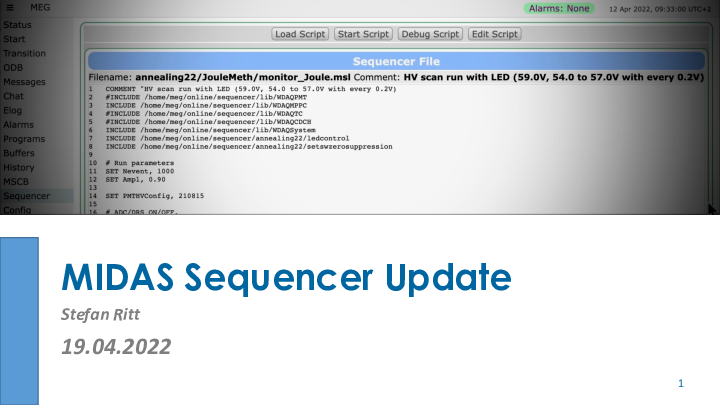
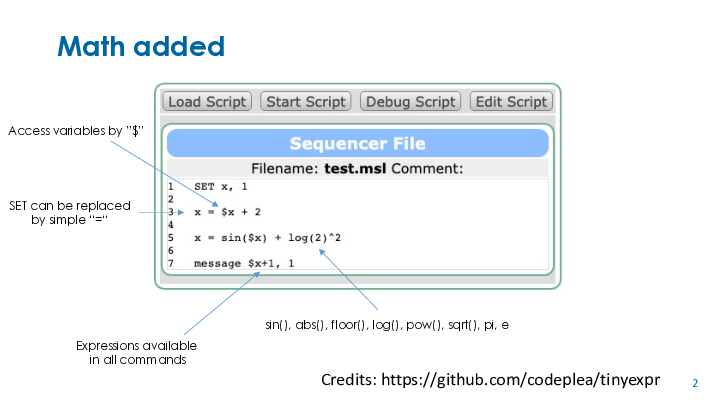
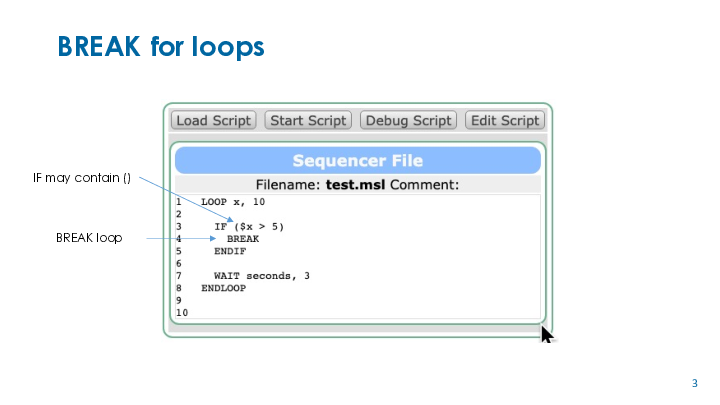
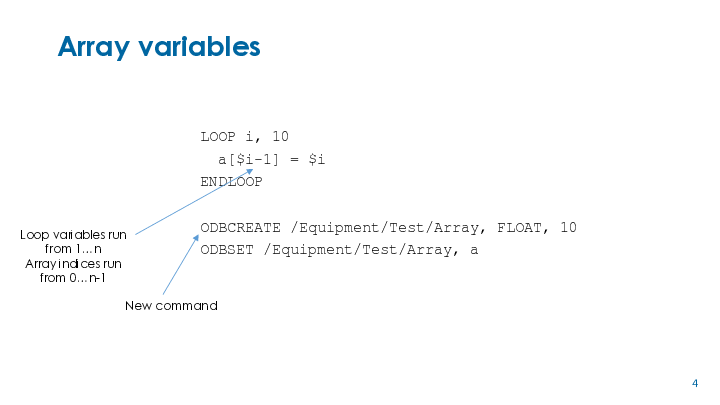
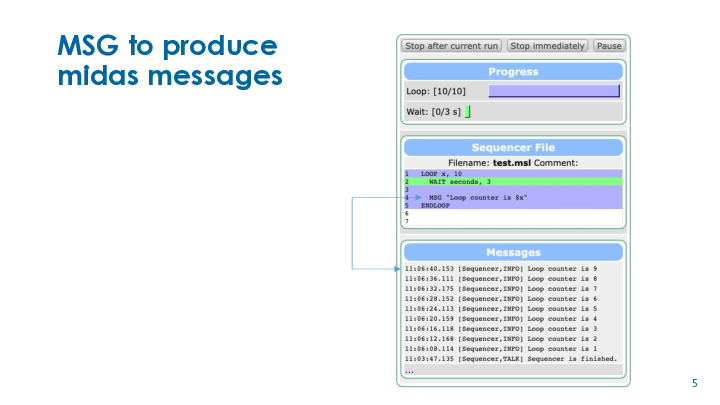
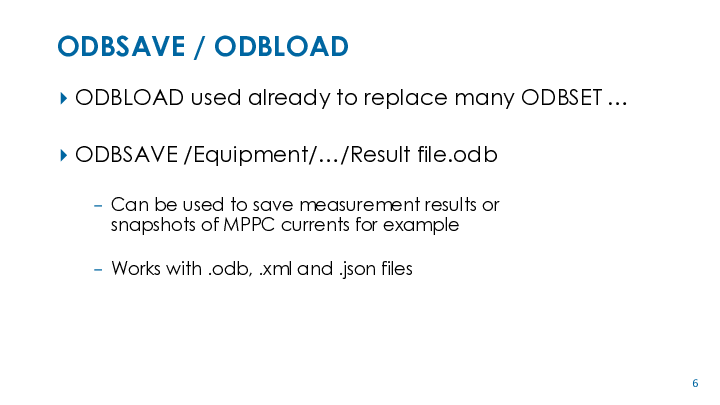
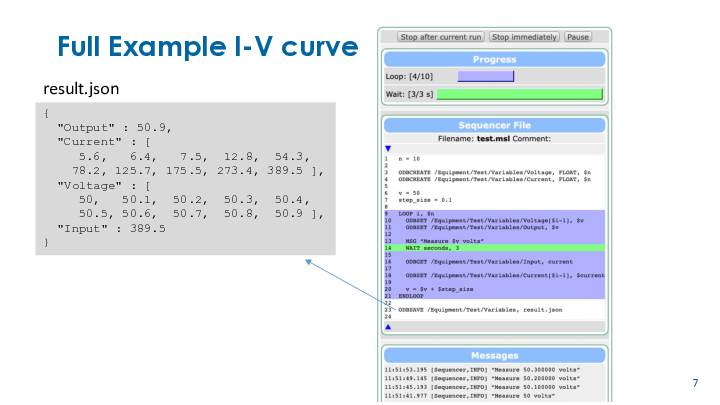
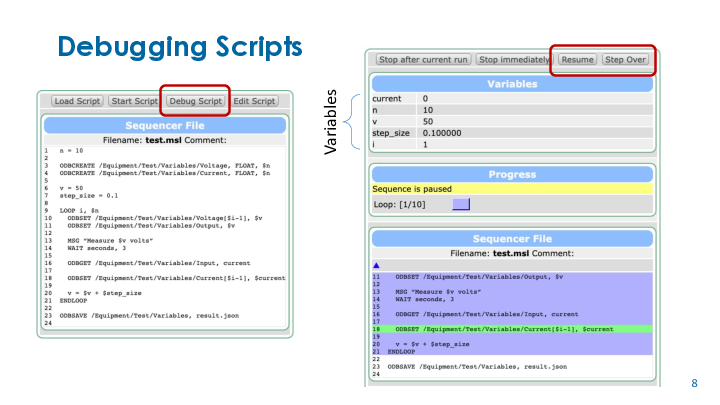
|
|
2389
|
30 Apr 2022 |
Konstantin Olchanski | Info | added web pages for "show odb clients" and "show open records" | for a long time, midas web pages have been missing the equivalent of odbedit
"scl" and "sor" to display current odb clients and current odb open records.
this is now added as buttons "show open records" and "show odb clients" in the
odb editor page.
as in odbedit, "sor" shows open records under the current subtree, i.e. if you
are looking at /equipment, you will not see open records for /experiment. to see
all open records, go to "/".
commit b1ab7e67ecf785744fff092708d8389f222b14a4
K.O. |
|
2390
|
01 May 2022 |
Konstantin Olchanski | Info | added web page for "mdump" | added JSON RPC for bm_receive_event() and added a web page for "mdump".
the event dump is a hex dump for now.
if somebody can contribute a javascript decoder for midas bank format, it would be greatly appreciated.
otherwise, I will eventually write my own decoder library patterned on midasio.h and midasio.cxx.
as of commit 5882d55d1f5bbbdb0d9238ada639e63ac27d8825
K.O. |
|
2391
|
01 May 2022 |
Konstantin Olchanski | Info | added web page for "mdump" | > added JSON RPC for bm_receive_event()
there is a number of problems with implementing bm_receive_event() as a RPC:
1) mhttpd has only event buffer 1 read pointer for all javascript connections, if two browser tabs are
running mdump, they will "steal" events from each other.
2) javascript connections are state-less and we cannot specify per-connection event_id and trigger_mask
filters to bm_receive_event(). our bm_request_event() has to be for all event_id and all trigger_mask.
3) for same reason, we cannot have some requests to be GET_ALL, some to be GET_RECENT and some to be
GET_OLD (if GET_OLD is ever implemented).
Problem (1) is hard to fix. Only solution I can see is to have mhttpd have it's own event buffer that can
somehow track which events have been sent to which javascript connection.
The same scheme allows implementing GET_ALL and per-connection event_id and trigger_mask filters.
The difficulty is in detecting javascript connections that are no longer active and it's event request and
events we have buffered for it can be deleted. Unlike proper rpc clients, javascript browser tabs can be
closed without warning and without opportunity to tell rpc server that they are closed, gone.
K.O. |
|
2392
|
01 May 2022 |
Konstantin Olchanski | Info | added web page for "mdump" | > added a web page for "mdump".
missing functions:
- get a list of existing event buffers (should read event buffer names from /Experiment/Buffer sizes)
- selector box to select event buffer
- button for "get next" and "get new" (should call bm_skip_event() before bm_receive_event())
- entry fields for event_id and trigger_mask event filter
- check box for "keep getting new data" and entry field for update frequency
- (eventually) entry field for bank name filter
K.O. |
|
2394
|
02 May 2022 |
Stefan Ritt | Info | added web page for "mdump" | Here are some of my thoughts:
- I volunteer to write the JavaScript midas bank decoder. Just a couple of pure javascript functions, no
midasio.cxx library needed.
- If different javascript connections "steal" events from each other, I would not be concerned. Actually I
would rather like that all connections see the SAME event. So mhttpd keeps one event, serves it to all
links, so displays are consistent. If a browser wants to see the "next" event, it send the old serial
number and days "please send next event AFTER serial number". If the serial number is larger than the
event in the buffer, mhttpd fetches a new event and puts it into its buffer.
- Since javascript connections are connectionless, I would rather pass event_id and trigger_mask with each
request. Then mhttpd can retrieve events until event_id and trigger_mask match, then serve that event.
Since reading events from a midas buffer is fast (many 10'000s of events per second), the won't be much of
a delay.
- GET_ALL does not make sense for browsers, you don't want to slow down any frontend. If someone wants to
do histogramming in the browser, then GET_SOME (which is kind of GET_OLD) would make sense, but most of
the cases we have some single event display, and there a GET_RECENT is most appropriate. |
|